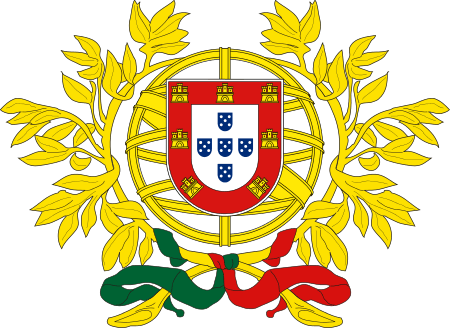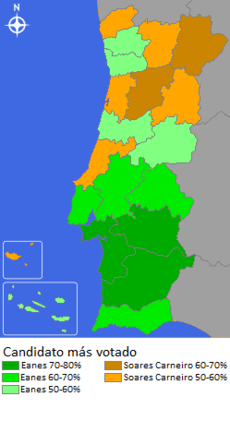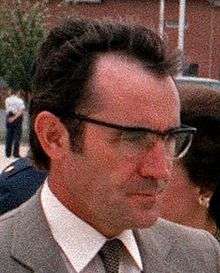Portuguese presidential election, 1980
|
| ||||||||||||||||
| ||||||||||||||||
| Turnout |
84.4% | |||||||||||||||
|---|---|---|---|---|---|---|---|---|---|---|---|---|---|---|---|---|
| ||||||||||||||||
| ||||||||||||||||
| This article is part of the series: |
| Politics and government of Portugal |
|---|
 |
| Portugal |
The Portuguese presidential election of 1980 was held on 7 December.
Incumbent president General Ramalho Eanes gathered the support of the Socialist Party, despite the objection of their leader, Mário Soares, and also the support of the Portuguese Communist Party, whose candidate, Carlos Brito, withdrew the week before the election giving his support to Eanes. The Communist Party of the Portuguese Workers also gave support to Eanes, whose picture became a feature on numerous walls around the country, painted by Communist Party activists.
One of the major players in the democratic revolution of 1974, Otelo Saraiva de Carvalho, was also a candidate, for the second time, but finished far behind his previous result of 1976. The newly-founded Workers Party of Socialist Unity presented its own candidate, Aires Rodrigues.
His main opponent, General Soares Carneiro, was known for his right-wing views and was branded by opponents as a hardliner, with links to the dictatorial regime that had been overthrown]] only six years earlier. He was supported by the Democratic Alliance, a centre-right coalition of the Social Democratic Party, the Democratic Social Center, and the smaller People's Monarchist Party.
Two days before the election, two of Soares Carneiro's leading supporters, Prime Minister Francisco Sá Carneiro (no relation) and Defence Minister Adelino Amaro da Costa, died in the 1980 Camarate air crash while they were heading for a rally in Oporto. Despite the accident, the election went ahead as planned, and predictions that a second round would be needed were shown to be wrong, with Ramalho Eanes winning with almost 57 percent, against 40 percent for Soares Carneiro.
Procedure
Any Portuguese citizen over 35 years old has the opportunity to run for president. In order to do so it is necessary to gather between 7500 and 15000 signatures and submit them to the Portuguese Constitutional Court.
According to the Portuguese Constitution, to be elected, a candidate needs a majority of votes. If no candidate gets this majority there will take place a second round between the two most voted candidates.
Candidates
- António Ramalho Eanes, Incumbent President since 1976 and eligible for a second term, Independent candidate supported by the Socialist Party, Portuguese Communist Party and the Portuguese Workers' Communist Party;
- António Soares Carneiro , Military officer, supported by the Democratic Alliance;
- Carlos Galvão de Melo, General officer, Member of the National Salvation Junta, Independent candidate;
- Otelo Saraiva de Carvalho, Military officer, Independent candidate;
- António Pires Veloso, Major general of the Portuguese Army, Independent candidate;
- António Aires Rodrigues, supported by the Workers Party of Socialist Unity
- Carlos Brito, Official candidate of the Portuguese Communist Party, Left the race to support Ramalho Eanes;
Results

Summary of the 7 December 1980 Portuguesepresidentialelection results
| Candidates | Supporting parties | First round | ||
|---|---|---|---|---|
| Votes | % | |||
| António Ramalho Eanes | Independent | 3,262,520 | 56.44 | |
| António Soares Carneiro | Democratic Alliance | 2,325,481 | 40.23 | |
| Otelo Saraiva de Carvalho | Independent | 85,896 | 1.49 | |
| Carlos Galvão de Melo | Independent | 48,468 | 0.84 | |
| António Pires Veloso | Independent | 45,132 | 0.78 | |
| António Aires Rodrigues | Workers Party of Socialist Unity | 12,745 | 0.22 | |
| Carlos Brito[A] | Portuguese Communist Party | left the race | ||
| Total valid | 5,780,242 | 100.00 | ||
| Blank ballots | 44,014 | 0.75 | ||
| Invalid ballots | 16,076 | 0.28 | ||
| Total (turnout 84.39%) | 5,840,332 | |||
| A He left the race in favor of Ramalho Eanes. | ||||
| Source: Comissão Nacional de Eleições | ||||
See also
References
- "CNE Resultados". Comissão Nacional de Eleições. Retrieved 17 May 2005.
- "Centro de Estudos do Pensamento Político". Retrieved 17 May 2005.

